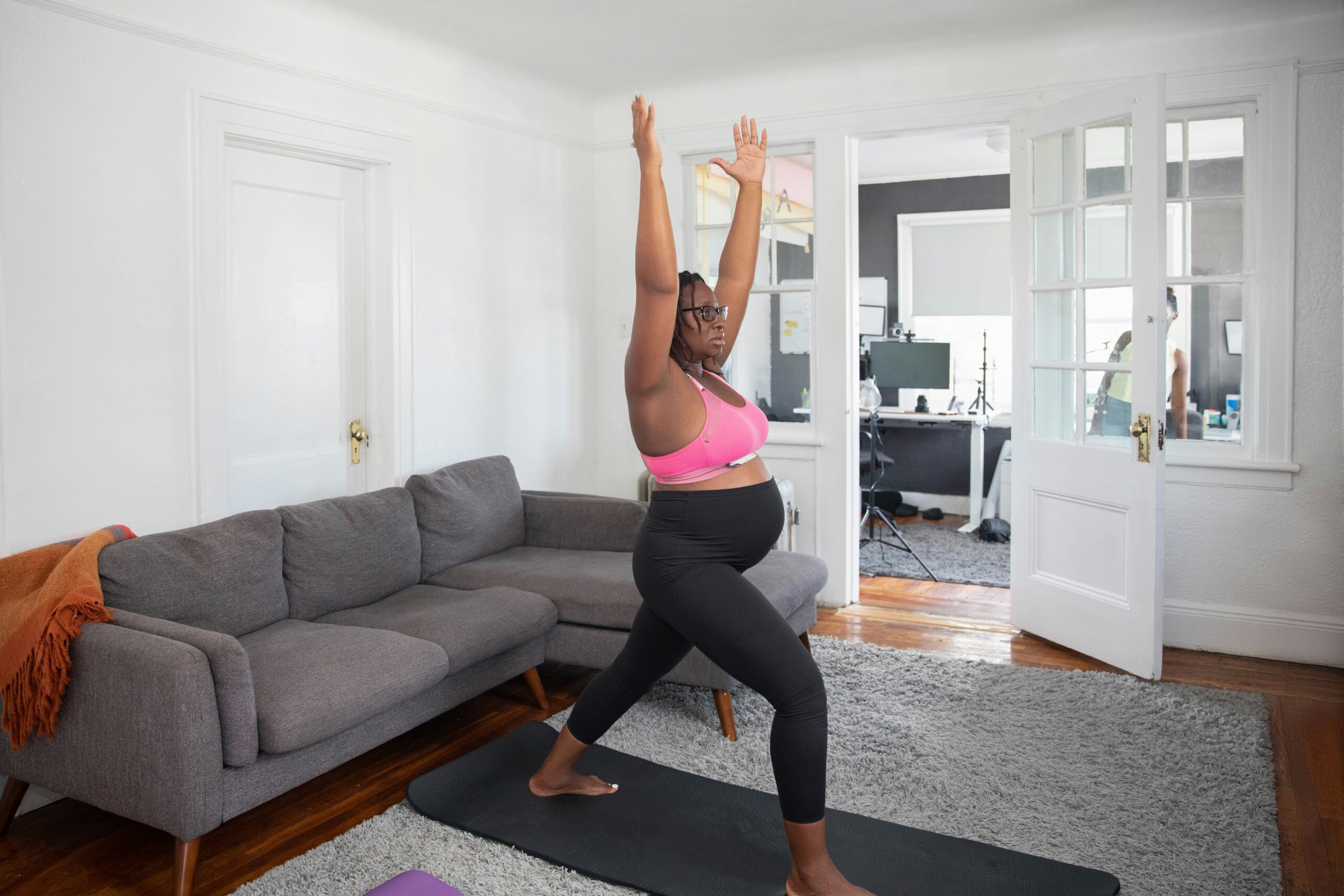When you discover you’re pregnant, there’s a moment of shock, then excitement, then you likely go into planning mode. Setting up your first prenatal appointment, modifying your diet—and wondering if you can continue the same activities you enjoyed before you peed on a stick.
Once you start asking questions (and okay—Googling), you’ll hear over and over how important it is to remain active while pregnant. After all, it can help reduce complications like gestational diabetes, mitigate weight gain, boost mental health—and also just make you feel like yourself throughout those (very long) 40 weeks..
But let’s be honest: trying to find ways to stay active that feel good—and safe!— for you and your baby can be a little tricky. You want to exercise but also feel like you’re keeping your baby secure in your uterus, and some days, you might feel like getting active, even if it’s just a walk around the block, it can feel overwhelming.
But exercise is important—not only for your physical health, but your mental health as well. “Exercise gives you a much-needed endorphin boost, helping to alchemize those hormones and mood swings into gratitude,” says Wendy Puckett, certified Health and Life Coach, former collegiate track and cross-country runner for the University of Colorado and founder of Ballzy. :Exercise makes you feel strong and capable, and when you feel good, your baby feels good, too.”
Luckily, there are specific prenatal programs designed with the preggo lady in mind! These programs prioritize safety while helping moms-to-be to keep moving. They also help reduce any discomforts you might experience during pregnancy and help your body and mind prepare for the big day: labor. They’re beneficial and appropriate for all fitness levels of mothers-to-be.
- Why Exercise During Pregnancy is Important
- What to Look for in a Prenatal Exercise Program
- Our Top Picks for the Best Prenatal Exercise Programs
- Additional Tips for Staying Active During Pregnancy
- Safety Considerations for Prenatal Exercise
Why Exercise During Pregnancy is Important
Before we dive into the best prenatal exercise programs, first, let’s understand why prenatal exercise is crucial for both the mother and the baby. While you have probably heard that staying active during pregnancy is essential, the benefits go way beyond physical health.
Physical Benefits
“Exercise helps improve sleep quality, enhances overall fitness and strength and supports key areas like blood sugar control, blood pressure, circulation and digestion. It also eases the physical demands of carrying extra weight, reduces strain on the joints and relieves back pain,” Puckett says.
Beyond these, exercise during pregnancy strengthens the muscles you’ll need for labor and delivery. Doing safe exercises can strengthen the muscles that support your uterus, bowel and bladder, which are all needed in labor and delivery. (That’s right, those Kegel exercises and squats are quite literally preparing you for the finish line of pregnancy—and the start of postpartum recovery.)
Mental and Emotional Benefits
Pregnancy brings an entire whirlwind of emotions, (thank you, hormones!), and that’s where exercise can help your mental well-being. Staying active during pregnancy can also reduce stress, anxiety and the risk of prenatal depression.
“Let’s be honest—pregnancy can sometimes make you feel like your body is on loan to a small ‘being.’ Exercise helps you reconnect with your inner strength and feel embodied and empowered,” Puckett explained. “Exercise gives you a much-needed endorphin boost, helping to alchemize those hormones and mood swings into gratitude. It helps you keep your sense of humor while navigating your body’s new, often surprising happenings. Exercise makes you feel strong and capable, and when you feel good, your baby feels good, too. So, really, you’re working out for both of you!”

What to Look for in a Prenatal Exercise Program
Now that you know the benefits of staying active, how do you know what to look for in prenatal exercise programs? Before choosing a program, it’s important to know what makes a prenatal exercise plan safe and effective.
Focus on Safety
Generally speaking, the recommendation from your OB/GYN will be you can continue to do any type of workout you did before getting pregnant, as long as it feels comfortable. So, if you were running eight miles a week and you have the energy to continue—go for it! But, if you’ve never ran a day in your life, pregnancy isn’t the time to sign up for a 10K. If you want to be extra cautious, you can choose a program that is led by certified trainers who specialize in pregnancy fitness and are aware of the limitations and needs of expectant mothers.
“Look for trainers who really understand pregnancy and know how to work with the unique challenges of each trimester. You want someone who’s not just handing you generic workouts but giving you exercises and cues that keep you feeling strong, empowered, and safe—adapting exercise as your body feels like it’s on a new adventure every month,” Puckett says.
You want an exercise that focuses on strengthening your body without pushing you beyond your limits. If you lifted heavy weights before pregnancy, you can continue to do so, but you might find, eventually, it’s uncomfortable—and impossible—to do certain movements with your growing belly. Or, with some of the aches and pains that naturally come with pregnancy.
A good rule of thumb is to not continue to do a movement or exercise if it hurts—and this is true before, during or after pregnancy.
Adaptability for Different Stages of Pregnancy
While you might find a program that works great in your first trimester, by the time your belly grows and you’re knee-deep in your third trimester, it might not feel the same. That’s not only okay—but expected!
Look for programs that offer modifications as the pregnancy progresses, ensuring that exercises remain safe and effective during each trimester. This could be your trainer offering changes during the exercise or creating new movements to accommodate your growing belly. Also, always remember to listen to your body. Never push yourself beyond what feels comfortable, especially as your pregnancy progresses.
Variety and Flexibility
If you get bored doing the same ‘ole, same ‘ole—seek a program that has a variety of exercises, like strength training, yoga and cardio, to keep workouts exciting and well-rounded. You’re pregnant for nine-plus months, so you’ll want a program that keeps you interested and wanting to go because let’s face it, doing the same workout every day can get old fast.
Programs that offer flexibility in scheduling, whether through apps or on-demand videos, are top-tier. This will allow you to fit into your programs whenever you’re available. Whether that’s in between work meetings or early Sunday morning, flexibility in scheduling can make a big difference when it comes to staying consistent.

Our Top Picks for the Best Prenatal Exercise Programs
Now that you know why prenatal exercise programs are so beneficial, where do you start to find them? Here are our carefully curated selections of the best prenatal exercise programs. Each program caters to different fitness levels and preferences.
1. The Bloom Method
- What it is: A prenatal fitness program that focuses on diaphragmatic breathing, pelvic floor strengthening and safe core workouts.
- Why It’s Great: Offers customized programs based on your trimester and fitness level, including strength training and low-impact cardio.
- Who is it for?: Moms-to-be looking for a comprehensive, holistic approach to prenatal fitness that includes education on pregnancy-specific body changes.
2. Fit Pregnancy Club
- What it is: A virtual fitness club offering live and on-demand prenatal workouts that combine strength, cardio, and flexibility exercises.
- Why It’s Great: Workouts are designed to be quick and effective, making it easy for busy moms-to-be to stay active.
- Who is it for?: Women who want a mix of high-energy, low-impact exercises that fit into a tight schedule.
3. Expecting and Empowered
- What it is: A guided prenatal and postpartum workout plan created by a physical therapist and a fitness trainer, focusing on safe strength training.
- Why It’s Great: Includes trimester-specific workouts that evolve as your pregnancy progresses, with an emphasis on preparing the body for labor.
- Who is it for?: Expectant mothers looking for a structured, progressive program designed by health professionals.
4. Glo: Prenatal Yoga Classes
- What it is: Glo offers a variety of prenatal yoga classes that focus on mindfulness, flexibility, and relaxation, along with physical strength.
- Why It’s Great: With access to hundreds of classes and different instructors, you can choose sessions that match your energy level and schedule.
- Who is it for?: Moms who prefer a yoga-based exercise routine that focuses on breathing, relaxation, and stretching.
5. Peloton Prenatal Classes
- What it is: Peloton offers a selection of prenatal-specific cycling, yoga and strength classes designed for expectant mothers. Many Peloton instructors also taught throughout their pregnancies—like Robin, Selena, Callie, Becs, Jess King and others—so you can take those classes and match how they modify movements.
- Why It’s Great: Offers both live and on-demand classes, with the ability to track progress and modify workouts based on how you feel.
- Who is it for?: Peloton members looking for prenatal-friendly classes to integrate into their existing workout routine.
6. Body by Trimester with Sarah Haley
- What it is: A trimester-specific workout program designed by fitness expert Sarah Haley, focusing on safe strength training, cardio, and flexibility exercises.
- Why It’s Great: Provides detailed modifications for each trimester, helping to target common pregnancy aches while maintaining fitness.
- Who is it for?: Expectant mothers looking for a safe, yet challenging fitness program.
7. Knocked-Up Fitness® Prenatal Program by Erica Ziel
- What it is: Focuses on improving mom’s quality of life, helping her prepare for pregnancy, birth and have easier recoveries.
- Why It’s Great: “Our moms continually come back pregnancy after pregnancy, and they continue onto my Core Rehab Program postpartum. I also offer my Core Athletica® Pre/Postnatal Exercise Specialist Instructor Course, designed for those who want to do a deeper dive and for personal trainers, pilates instructors and yoga instructors,” Ziel says.
- Who is it for?: Expectant mothers and postpartum moms.
8. Get Mom Strong
- What it is: A fitness app that focuses on total body workouts, recovery and mobility flows and health tips from pelvic floor PTs.
- Why It’s Great: Easy to use app that starts with a free trial. You’re also able to track your progress and get nutritional advice.
- Who is it for?: Pregnant and postpartum moms.
Additional Tips for Staying Active During Pregnancy
While the best prenatal exercise programs are great for staying active, there are plenty of other things you can do every day to help your body. These tips will help ensure you get the most out of your chosen prenatal exercise program.
Listen to Your Body
Always, always, always pay attention to how your body feels during exercise. If something feels uncomfortable or causes pain, stop and consult your doctor or trainer. Also remember that your body is constantly changing during pregnancy. So what feels excellent one day might feel like the next. Tell your trainer what feels good and what doesn’t. They can provide guidance on how to modify exercises to help you feel your best. It’s also totally okay to take a break if you need to —pregnancy is a marathon, not a sprint!
Stay Hydrated and Nourished
You’ve probably heard this, but staying hydrated and nourished during pregnancy is so important. Every day, you should be drinking eight to twelve cups of water. Make sure you’re squeezing in this water intake, before, after and during your exercise. Keep your water bottle nearby during programs to help you remember to sip when you need to.
Nutrition wise, make sure you are eating a balanced diet full of protein and healthy carbs. Fuel up before and after your workouts to help replenish and nourish your body. Even taking a quick bar or a smoothie for after can help your body and baby.
Focus on Core and Pelvic Floor Strength
Lastly, don’t forget about the core and pelvic floor. Your pelvic floor muscles are essential for supporting the body during pregnancy and preparing for labor.
“It’s important to incorporate movements and breathing techniques that can help you better prepare your body for birth, this includes learning how to release and relax through your pelvis and pelvic floor, while learning how to effectively strengthen your pelvic floor and deep core,” Ziel explained.
“These techniques could help you push more effectively during the pushing phase of labor and potentially decrease tearing for vaginal births and could even help you recover more easily from a cesarean birth. I hear often from our moms that they are able to push more effectively and their recovery is easier, and when a cesarean is needed even their OB/GYN comments on how smooth their abdominal tissue is and is amazed at how quickly they heal.”
To strengthen your pelvic floor, try out kegel exercises or safe core workouts that promote a healthy pregnancy and easier postpartum recovery. These exercises can make the biggest difference when it comes to labor and delivery. So even on days where you can’t make a full workout, try a few minutes or pelvic floor exercises.
Check with Your Doctor Before Starting
Before you start one of the best prenatal exercise programs or other workouts, consult with your healthcare provider, especially if you have pre-existing medical conditions or pregnancy complications. This is non-negotiable. Your doctor knows your body and can help you create a plan that works for you.
Staying active during pregnancy is such a powerful way to keep your physical and mental well-being in check. However, it’s so important to listen to your body and consult with your doctor beforehand. By finding the best prenatal exercise programs for you that focus on safety, modifications and flexibility, you can feel strong during all stages of pregnancy.
“Don’t forget you have a lot of energy going into creating an incredible human being,” Ziel says. “So be kind to yourself and be proud of the healthy habits you are able to incorporate each day!
Author
-

Esha Minhas is a third-year student at Northeastern University studying Journalism and Political Science. She's currently the editorial and social intern for Mila & Jo Media. Esha is also the Deputy Sports Editor for The Huntington News and covers Northeastern men's hockey. When she's not busy with work or school, you can find her at the gym, baking for her friends and family and watching anything sports related.
View all posts




